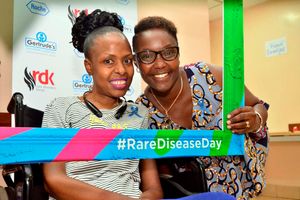The reality of living with a rare condition in Kenya

What you need to know:
- 'Healthy Nation' spoke to Christine Mutena, co-founder of Rare Disorders Kenya, an organisation consisting of patients, parents and caregivers of persons diagnosed with rare diseases.
- RDK’s aim is to address the unique needs of patients.
In a country where accessing affordable health care is almost a far-fetched dream for many, those with rare conditions find themselves in an even worse situation, fighting against not just the disease, but also systematic and societal odds. Healthy Nation spoke to Christine Mutena, co-founder of Rare Disorders Kenya (RDK), an organisation consisting of patients, parents and caregivers of persons diagnosed with rare diseases. RDK’s aim is to address the unique needs of patients.
From your records, which are the most common rare diseases in Kenya?
Some of the common conditions we have come across are multiple sclerosis, muscular dystrophy, narcolepsy and myasthenia gravis.
But given that Kenya doesn’t have a national registry (as yet) for rare diseases, it is not possible to give demographics and the most affected areas. Most of the conditions we have listed are for people who have reached out to us and not necessarily what is on the ground.
What are the challenges facing people living with rare diseases in Kenya?
Scarcity of medical knowledge, delayed diagnosis, misdiagnosis, unnecessary treatments and surgeries, social isolation, financial hardship, lack of treatment options and early death. Other challenges are cultural beliefs and stigma. Patients are more socially, economically, and culturally vulnerable and isolated.
What challenges does your organisation encounter in the fight against rare diseases and how do you tackle them?
The biggest hurdle is limited resources as our operations are out-of-pocket expenses. There is also the lack of knowledge or awareness that rare diseases exist, which makes the sensitisation process even more strenuous and costly.
Currently, Kenya does not have an official definition of what constitutes a rare disease or a formal rare disease registry and as such the lack of data on the prevalence and history of the diseases limits or prevents informed targeting of resources towards the illnesses.
Kenya has adopted Universal Health Coverage as set out in the Big Four Agenda. Have rare diseases been fully given attention through this?
The Ministry of Health recently created a Technical Working Group on Rare Disorders (TWG-RD) and through this we believe that the diseases will be given attention. RDK is part of the TWG and together with the government and other stakeholders we will ensure that no Kenyan suffering from rare diseases is left behind.
What are the interventions needed to combat rare diseases in Kenya?
Massive investment in research on the diseases. Also, policies and structures should be in place on top of awareness creation. This will help reduce stigma especially at the grassroots levels. This way, even that patient in the village will know that they are not alone and that they can seek (professional) assistance. There should be specialised services that go beyond urban settings as well as access to insurance for specialised services through NHIF. Finally, newborn screening should be an official procedure as research shows that more than 70 per cent of rare diseases are genetic.
pongaji@ke,nartionmedia.com





